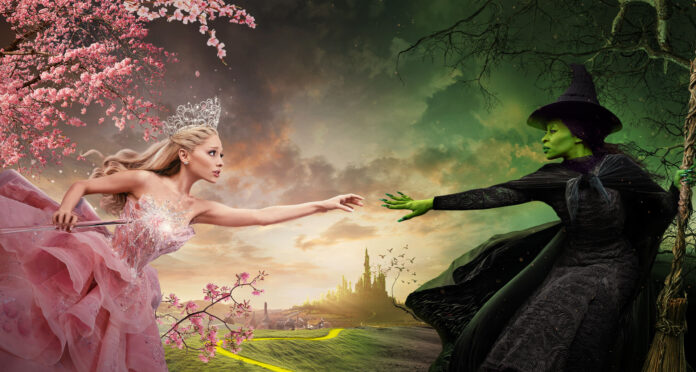Warning: Wicked spoilers ahead.
“That was fantastic,” said my younger sister as we battled the crowd on our way out of the Broadway Gershwin Theatre. Having seen a few other Broadway shows, such as Hamilton, Water for Elephants, and Hadestown, I can say that none compare to Wicked. We left the theatre with runny noses and heavy hearts knowing that this is what they meant by “the magic of theatre.”
Gatekept by a steep Broadway paywall, the new Wicked movie brings a once inaccessible story of self-acceptance to the masses on a big screen.
Acting as its central theme, “defying gravity” by overcoming what is dragging you down unifies this story within each viewer’s deepest insecurities, empowering self-love and individual connection.
Having a memorable theatre experience on Broadway with my family, I was naturally one of the first eyes to see the new adaptation.
Before my cinema experience, my social media feed was filled with promotional content from Ariana Grande and Cynthia Ariba’s emotionally vulnerable interviews or the repetitive final vocal riff of “Defying Gravity.” Though very easily ‘memed,’ the social media content and the not-so-compelling trailers left me scared of the potential damage the movie adaptation could do to the show’s reputation on Broadway. Nevertheless, I bought my Wicked-themed popcorn and settled into my premium theatre recliner seat.
Generally speaking, telling this story on the big screen was more effective than on the stage. Seeing Wicked on Broadway has been one of my favourite theatre experiences and I believe that it is one of the best shows on Broadway. I am not alone with this opinion because the film’s impact is reflected with a 90 per cent Tomatometer score on Rotten Tomatoes. Other emerging films such as Gladiator II and Moana 2 have only received 71 per cent and 66 per cent.
I guess Elphaba is not the only one defying expectations here.
The first thing that moves me to this conclusion is the use of music in the film. As a medium, film is heavily dependent on music to convey emotion. With this theory in mind, not only do we hear the same sing-along songs that we know and love but, the film dives deeper into them. I am talking about the theory of musical motifs scattered throughout the film’s score.
These are little musical melodies that reference moments from the big musical numbers. One of my favourite examples is when Galinda arrives at Shiz University, a slow, brassy undertone of Popular’s main melody foreshadowing her rise to fame amongst her peers. Moments like these make the music in this film strong and is something that is not relied on in the live musical theatre format.
The film’s attention to detail throughout each moment made it so compelling. Small details such as the choice to use mainly practical sets and singing live as opposed to pre-recording made Wicked more impactful.
The movie was really created by a series of fans who wanted to do a service to the legacy of the live musical.
The film’s co-star Ariana Grande told Billboard that if she hadn’t been cast she “might have ended up in an insane asylum.”
At my Sunday 8 p.m. showing, the audience left without a single dry eye. This was the exact same reaction that my sister and I noticed from the audience on Broadway. It is a difficult task to emotionally impact an audience through a screen in the same way as a live theatre production. This ability speaks volumes.
I believe the film adaptation was more effective in telling the story of Wicked. Stephen Schwartz is a genius storyteller and has created a timeless piece that will no doubt transcend generations. Whether you have seen Wicked on Broadway or not, people should experience this story while it’s still in theatres.

